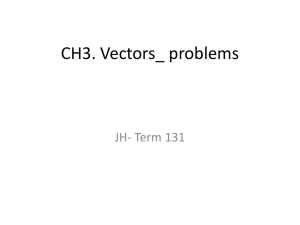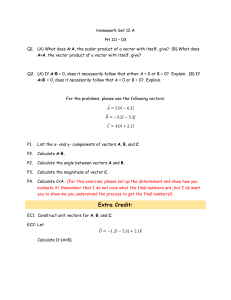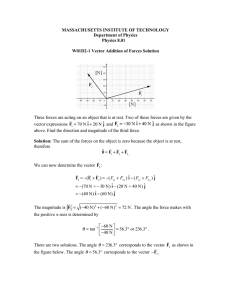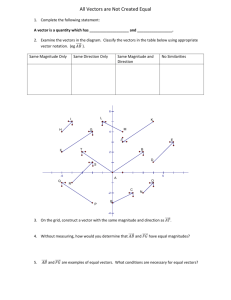Vectors - Eastern Mediterranean University Open CourseWares
advertisement
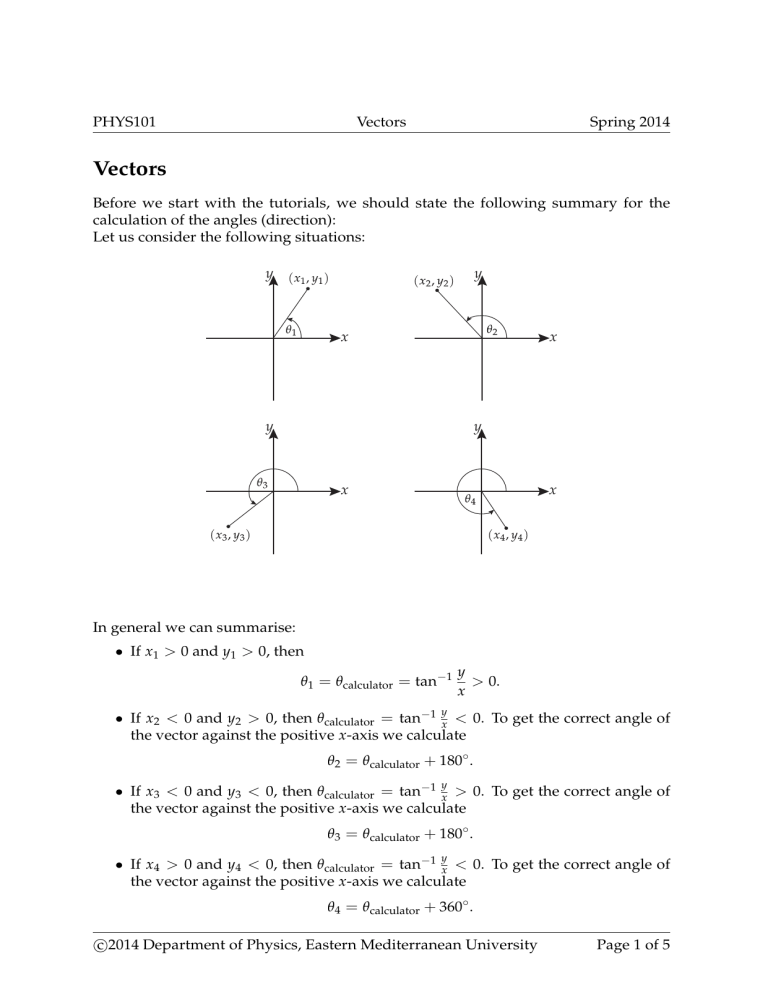
PHYS101 Vectors Spring 2014 Vectors Before we start with the tutorials, we should state the following summary for the calculation of the angles (direction): Let us consider the following situations: y y x x y y x x In general we can summarise: • If x1 > 0 and y1 > 0, then θ1 = θcalculator = tan−1 y > 0. x y • If x2 < 0 and y2 > 0, then θcalculator = tan−1 x < 0. To get the correct angle of the vector against the positive x-axis we calculate θ2 = θcalculator + 180◦ . y • If x3 < 0 and y3 < 0, then θcalculator = tan−1 x > 0. To get the correct angle of the vector against the positive x-axis we calculate θ3 = θcalculator + 180◦ . y • If x4 > 0 and y4 < 0, then θcalculator = tan−1 x < 0. To get the correct angle of the vector against the positive x-axis we calculate θ4 = θcalculator + 360◦ . c 2014 Department of Physics, Eastern Mediterranean University Page 1 of 5 PHYS101 Vectors Spring 2014 Tutorial Questions 1. What are the x component and the y component of a vector : ~a in the xy plane if its direction is 250◦ counterclockwise from the positive direction of the x axis and its magnitude is 7.3m? Solutions: (a) The x component of ~a is given by a x = a cos(θ ) = (7.3 m) cos 250◦ = −2.50 m (b) Similarly, the y component is given by ay = a sin(θ ) = (7.3m) sin 250◦ = −6.86 m ~ is −25.0 m and the y component is +40.0 m. 2. The x component of vector A ~ (a) What is the magnitude of A? ~ and the positive direction of (b) What is the angle between the direction of A x? Solutions: ~ is: (a) The magnitude of A ~ = A q A2x + A2y = q (−25.0 m)2 + (40.0 m)2 = 47.2 m ~ and the positive direction of x is (b) The angle between the direction of A θ = tan−1 Ay 40.0 m = tan−1 = 122◦ Ax −25.0 m 3. Two vectors are given by ~a = (4.0 m)î − (3.0 m)ĵ + (1.0 m)k̂ and ~b = (−1.0 m)î + (1.0 m)ĵ + (4.0 m)k̂. In unit vector notation find (a) ~a + ~b (b) ~a − ~b (c) a third vector ~c such that ~a − ~b +~c = 0. Solutions: c 2014 Department of Physics, Eastern Mediterranean University Page 2 of 5 PHYS101 Vectors Spring 2014 (a) ~a + ~b = (4.0 m − 1.0 m) î + (−3.0 m + 1.0 m) ĵ + (1.0 m + 4.0 m) k̂ = (3.0 î − 2.0 ĵ + 5.0 ĵ) m (b) ~a − ~b = (4.0 m + 1.0 m) î + (−3.0 m − 1.0 m) ĵ + (1.0 m − 4.0 m) k̂ = (5.0 î − 4.0 ĵ − 3.0 k̂) m (c) The requirement ~a − ~b + ~c = 0 leads to ~c = ~b − ~a which we note is the opposite of what we found in part (b). Thus, ~c = (−5.0 î + 4.0 ĵ + 3.0 k̂) m. 4. Given are the vectors ~a = (4.0 m)î + (3.0 m)ĵ, and ~b = (−13.0 m)î + (7.0 m)ĵ (a) What is the sum ~a + ~b? (b) What is the magnitude of ~a + ~b? (c) What is the direction of ~a + ~b? Solution: (a) The sum ~a + ~b = −9.0 m î + 10 m ĵ (b) The magnitude of ~a + ~b = q (−9.0 m)2 + (10 m)2 = 13 m (c) The direction of ~a + ~b is θ = tan−1 10 m = 132◦ −9.0 m y 1 1 x Note: The calculator displays −48◦ as the range of the tan−1 function is between −90◦ and 90◦ . As the actual angle θ > 90◦ , we can get the real angle as θ = −48◦ + 180◦ = 132◦ . c 2014 Department of Physics, Eastern Mediterranean University Page 3 of 5 PHYS101 Vectors Spring 2014 5. A car is driven east for a distance of 50 km, then north for 30 km, and then in a direction 30◦ east of north for 25 km. Sketch the vector diagram and determine (a) the magnitude and (b) the angle of the car’s total displacement from its starting point. Solutions: ~ = 50 î km , ~B = 30 î km, and C ~ = 25 km cos(60◦ ) î + 25 km sin(60◦ ) ĵ (a) Given is A The total displacement ~r of the car from its initial position is then ~ + ~B + C ~ = 63 km î + 52 km ĵ. ~r = A ~r has the magnitude q r= halliday_c03_038-057hr.qxd (b) The (63 km)2 + (52 km)2 = 82 km 17-09-2009 12:25 Page 55 direction of the displacement vector ~r is then −1 51.7 km tan = 40◦ 62.5 km against the horizontal. 6. The two vectors ~a and ~b in the figure below have equal magnitudes of 10.0 m PROBLEMS and the angles are θ1 = 30◦ and θ2 = 105◦ . 105°. Find the (a) x and (b) y components of their vector sum : r , (c) the magnitude of : r , and (d) the angle : r makes with the positive direction of the x axis. b θ2 •16 For the displacement vectors : a " (3.0 m)î # (4.0 m)ĵ and b " : : (5.0 m)î # (!2.0 m)ĵ , give a # b in a θ1 (a) unit-vector notation, and as (b) a x magnitude and (c) an angle (rela- O : : Fig. 3-28 Problem 15. tive to î ). Now give b ! a in (d) unit-vector notation, and as (e) a 2014 Department of Physics, Eastern Mediterranean magnitude and (f) an angle. : ILW Three vectors : •17 a , b , and : c each have a magnitude of 50 m and lie in an xy plane. Their directions relative to the positive direction of the x axis are 30°, 195°, and 315°, respectively. What are : c ••25 Oasis B is 25 km due east of oasis A. Starting fro A, a camel walks 24 km in a direction 15° south of east an walks 8.0 km due north. How far is the camel then from oasi y ••26 What is the sum of the following four vectors in (a) u tor notation, and as (b) a magnitude and (c) an angle? A " (2.00 m)î # (3.00 m)ĵ : : : : B: 4.00 m, at #65.0 C " (!4.00 m)î # (!6.00 m)ĵ : : d1 # d2 : : 5d3, d1 : d2 D: 5.00 m, at !235 : 3d3, : ••27 If and d3 " 2î # 4 " ! " : : what are, in unit-vector notation, (a) d1 and (b) d2? ••28 Two beetles run across flat sand, starting at the same University 4 of 5 m at 30° north of d Beetle 1 runs 0.50 m duePage east, then 0.80 Beetle 2 also makes two runs; the first is 1.6 m at 40° east north. What must be (a) the magnitude and (b) the directio second run if it is to end up at the new location of beetle 1? PHYS101 Vectors Spring 2014 If ~r is the sum ~r = ~a + ~b. Find the (a) the x component of ~r, (b) the y component of ~r, (c) the magnitude of ~r, (d) the angle ~r makes with the positive direction of the x-axis. Solutions: (a) r x = 10.0 m cos(30◦ ) + 10.0 m cos(30◦ + 105◦ ) = 1.59 m (b) ry = 10.0 m sin(30◦ ) + 10.0 m sin(30◦ + 105◦ ) = 12.1 m p (c) r = (1.59 m)2 + (12.1 m)2 = 12.2 m 12.1 m ◦ (d) θ = tan−1 ( 1.59 m ) = 82.5 c 2014 Department of Physics, Eastern Mediterranean University Page 5 of 5
